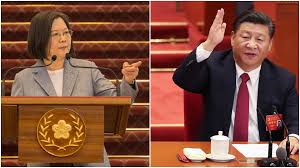Taiwan’s defense ministry said on Tuesday that China’s armed forces are capable of blockading the island’s key ports and airports, providing the latest assessment of what it calls a “grave” military threat posed by its bigger neighbor.
China has never renounced the use of force to annex democratic Taiwan and has increased military activities around the island, including flying warplanes into Taiwan’s air defense zone on multiple occasions.
In a report issued every two years, Taiwan’s defense ministry claimed China had engaged in “gray zone” warfare, noting 554 “intrusions” by Chinese warplanes into its southwestern theatre of air defense identification zone between September last year and the end of August.
According to military specialists, the technique is intended to exhaust Taiwan.
At the same time, China’s People’s Liberation Army (PLA) plans to modernize its forces by 2035 in order to “obtain superiority in possible operations against Taiwan and viable capabilities to deny foreign forces, posing a grave threat to our national security,” according to the Taiwan Ministry of Foreign Affairs.
“At this time, the PLA is capable of launching a local joint blockade against our important harbors, airports, and outward flight routes, effectively cutting off our air and sea lines of communication and disrupting the flow of our military supplies and logistic resources,” the ministry stated.
Taiwan is considered Chinese territory by China. A request for a response from the country’s defense ministry was not immediately returned.
Taiwanese President Tsai Ing-wen claims that Taiwan is already a sovereign nation and pledges to safeguard its independence and democracy.
Tsai has made strengthening Taiwan’s defenses a top goal, promising to build more domestically developed weapons, including submarines, and to purchase additional equipment from the US, the island’s most important arms supplier and foreign backer.
Over a four-day period in October, Taiwan recorded 148 Chinese air force planes in the zone’s southern and southwestern theaters, signaling a sharp rise in tensions between Taipei and Beijing.
China’s recent surge in military exercises in Taiwan’s air defense identification zone is part of what Taipei sees as a well-planned harassing strategy.
“It’s frightening behavior not only depletes our battle power and undermines our faith and morale, but it also tries to change or challenge the status quo in the Taiwan Strait in order to fulfill its aim of seizing Taiwan without a struggle,” according to the ministry.
To resist China’s desire to “quickly capture Taiwan while denying foreign intervention,” the ministry promised to step up its “asymmetric warfare” efforts to make any invasion as painful and difficult as possible for China.
This includes precision long-range missile strikes on Chinese sites, the deployment of coastal minefields, and increased reserve training.


















